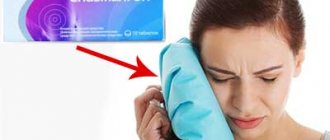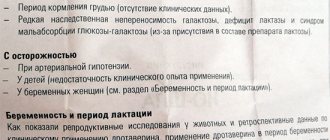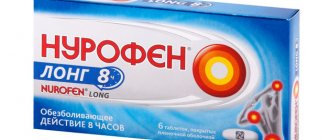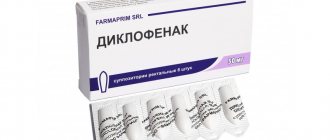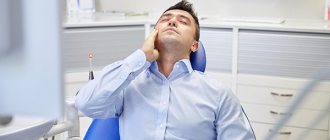First aid and emergency care for toothache
Patients with acute pain are accepted in our clinics WITHOUT QUEUE. Consultations are provided by telephone (until 21.00), by telephone (until 23.00).
Who knows about toothache? This constant companion accompanies a person when the teeth are affected by various pathological processes (caries, pulpitis, periodontitis), as well as periostitis, limited osteomyelitis, neuralgia of the 2nd and 3rd branches of the trigeminal nerve, periodontal disease and exposed necks of teeth. It occurs in one tooth or affects a group (local pain).
CARIES. Toothache during caries occurs due to the formation of a carious cavity and intensifies when a person eats, but if food debris is removed by cleaning the cavity in the tooth, it quickly disappears.
PULPITIS. It is characterized by the appearance of acute paroxysmal pain, which may intensify at night. Sometimes the pain radiates to the temple or ear. Initially, the attack can last up to 15 minutes. And the intervals between attacks can range from 1 - 3 hours to several days. As the process spreads, the attacks become longer, and the “light” intervals decrease.
PERIODONTITIS AND LIMITED OSTEOMYELITIS. When toothache occurs due to periodontitis and limited osteomyelitis, precise localization is typical. The diseased tooth reacts sharply to vertical percussion. There is a feeling that the diseased tooth is “higher” than the rest. The area of the diseased tooth is surrounded by swollen, hyperemic mucosa, the tooth itself becomes mobile. In this situation, treatment of periodontitis is required.
NEURALGIA OF THE 2ND AND 3RD BRANCHES OF THE TRIGEMINAL NERVE. A carious cavity in a tooth can provoke neuralgia of the 2nd and 3rd branches of the trigeminal nerve. The piercing neuralgic pain is not local, and is felt along the entire course of the nerve branch, affecting the entire half of the face. And pain with pulpitis, starting from the tooth, radiates to neighboring organs.
PERIODONTOSIS. With periodontal disease, toothache in the area of one or more teeth increases gradually. The affected teeth are surrounded by swollen and bluish gums. Sometimes the gums are inflamed and the pockets that form contain purulent discharge. The necks of the teeth become exposed and often hurt, and the teeth become mobile. Tooth pain is determined by horizontal percussion.
EXPOSURE OF TEETH NECKS. It is characterized by constant pain that is aggravated by contact with food, cold or hot, or when exposed areas of the teeth are touched.
For pain caused by caries or inflammation of the dental pulp, you need to take analgesics orally (for severe pain, analgesics are administered parenterally), moisten a cotton swab with camphorophenol and insert it into the carious cavity. A novocaine blockade helps, which is placed in the gum of the diseased tooth, at the level of the root.
In case of periodontitis or limited osteomyelitis, it is necessary to remove food debris from the carious cavity, into which a tampon moistened with pure alcohol is then inserted. Then they move on to thermal procedures, rinsing, you can put a heating pad, a compress, or give analgesics inside. If there are general symptoms such as headache, weakness, lack of appetite, or malaise, you should take antibiotics.
The patient should be urgently referred to a dentist. In this case, transportation of dental patients is carried out, as a rule, on their own, and only patients in serious condition are hospitalized.
For neuralgia of the 2nd and 3rd branches of the trigeminal nerve, when it is impossible to differentiate the diagnosis, it will be enough to take analgesics. When the cause of the pain is not clear, thermal procedures should not be used to avoid its intensification. In case of periodontal disease, it is necessary to remove food debris from the interdental spaces, then rinse the mouth with a 3% solution of hydrogen peroxide and a weak solution of potassium permanganate.
When the exposed necks of teeth hurt, you can rub sodium bicarbonate gruel into them, which is mixed with water or glycerin, or treat the necks of teeth with pure alcohol.
In all cases of intense toothache, do not wait for complications to arise when the patient’s condition becomes so severe that it is necessary to transport the patient by ambulance to the hospital.
I have a toothache: what to do?
If you have any kind of pain in your teeth, you should definitely make an appointment with a dentist as soon as possible. In addition, many clinics have a doctor on duty 24 hours a day to see patients with acute pain. He will conduct an examination, find out the exact cause of dentalgia, provide first aid and prescribe further treatment.
Before your visit, you can rinse your mouth with herbal decoctions or take your usual painkillers. Under no circumstances should you apply a heating pad to the sore cheek, or crushed garlic, onion or propolis tincture to the gum. This can speed up the course of the disease and additionally cause a burn to the mucous membrane.
Sometimes after taking medication or sleeping, the pain decreases greatly or disappears completely. Relief also comes if pus breaks out on the side of the gum during gumboil. But this relief is temporary: caries or pulpitis, and especially periodontitis, cannot be cured on their own. Most likely, the disease has become chronic and tissue destruction continues.
Common causes of toothache
There are many reasons why toothache can occur. Let's look at the most common of them:
- mechanical damage to tooth enamel (cracks);
- exposure of dentin or neck of the tooth;
- development of periodontitis or periodontitis;
- dental caries;
- pulpitis.
Stages of caries development
When tooth enamel is destroyed, caries spreads to the pulp, causing the patient to notice severe pain. It is worth noting that pain occurs in the area where the nerve endings are located in the tooth - through them the signal about pain is sent to the brain. The development of pulpitis usually occurs at night, and the patient may mistakenly believe that a completely different tooth is hurting. Often the pain spreads to the temporal region or to the ear.
Toothache
The development of periodontitis does not mean anything good. Essentially, this is an inflammatory process in the gums, accompanied by severe throbbing pain. There may also be a slight swelling near the tooth. If we talk about periodontitis, this is also an inflammatory process. But, unlike periodontitis, in which the gums become inflamed, periodontitis affects the human periosteum.
Stages of periodontitis
Toothache
Stages of periodontitis
Tooth pain: treatment cannot be ignored
Dentalgia is unpleasant sensations of varying strength in the tooth and surrounding tissues.
Pain occurs when nerve endings are affected, due to injury or inflammation. When there is inflammation, the cells produce an increased amount of fluid that comes out, causing the tissues to swell and put pressure on the nerves. If this occurs in the closed space of the pulp chamber or inside the bone socket, the pain becomes unbearable. In this article on Stom-Firms.ru we look at what pain occurs in inflammatory diseases and why it cannot be ignored.
Emergency help
If a toothache appears suddenly, you need to somehow alleviate your condition, especially if it is not possible to visit a dental clinic in the near future. Most patients first resort to painkillers. Most often the choice falls on Baralgin, Analgin, Nurofen or Ketanov.
Tablets for toothache
Taking these painkillers, as a rule, helps reduce pain and relieve inflammation in the gums. If you don’t have painkillers at hand, you can relieve pain with a cotton swab soaked in Valocordin. Apply the tampon to the sore spot for a few minutes and the pain will soon subside.
First aid for toothache
Visit to the dentist
Clean your mouth of food debris that may accumulate in the interdental spaces or holes in the tooth. It can also help with acute toothache. Dentists advise not to eat before visiting the dentist's office, as this is fraught with another attack of pain. Many traditional healers strongly recommend rinsing your mouth with a solution of soda or salt for toothache. This really helps.
Salt and soda
Propolis can also be considered an emergency treatment method. To do this, apply a few drops of propolis to a cotton swab and apply to the affected area. As practice shows, the pain will go away within 20 minutes. But you need to be extremely careful with propolis, since contact of the substance with the oral mucosa can cause damage.
Propolis
Visit to the dentist
Salt and soda
Propolis
Symptoms of the disease
It is quite easy to determine pulpitis - it is characterized by acute, paroxysmal toothache, which in most cases intensifies at night, as well as when eating hot and cold foods. Sometimes it is very difficult for the patient to understand which specific tooth is bothering him, since the pain spreads to the entire jaw. Externally, the disease can manifest itself as darkening of the color of tooth enamel, swelling or bleeding of the gums.
Treatment of dental pulpitis is a complex process that requires high qualifications. Don't self-medicate!
First aid for pulpitis:
- Take 1-2 tablets of analgesics (tempalgin, analgin, sedalgin, paracetamol).
- Clean the carious cavity from food debris, rinse the mouth with a warm 0.5-2% solution of baking soda.
- Painful symptoms are reduced by rinsing the mouth with a decoction of plantain, wormwood, and valerian.
- You should not heat the sore spot.
Important!
The described remedies only reduce toothache, but do not cure the disease! Therefore, it is necessary to contact your dentist as soon as possible!
Suspiciousness or a real threat: can you die from a toothache?
Toothache itself cannot cause death, but it is important to remember that it often signals the presence of a serious problem that threatens life or health. This is why dentalgia cannot be tolerated. It is necessary to seek qualified help for diagnosis and treatment as soon as possible.
Acute toothache (dentalgia) is an alarming signal indicating the development of a serious dental disease.
Dentalgia is often accompanied by other symptoms, including swelling, fever, chills, difficulty swallowing, bloody discharge from the periodontal tissues, and even a sudden increase in blood pressure.
Treatment of toothache in dentistry
When it comes to hypersensitivity, fluoridation and remineralization will help relieve toothache. The procedures quickly restore tooth enamel and protect it from the effects of acids and bacteria.
To cure toothache due to dental diseases, you most often need:
- pulp removal;
- root canal cleaning;
- root sealing;
- tooth restoration.
If purulent inflammation has developed in the soft tissues, treatment of toothache includes an incision in the gum to drain the pus. Therapy is carried out after the swelling is eliminated.
Traditional home healers
In the fight against acute toothache, various traditional medicine recipes are often used. Some of them are useless, but most, on the contrary, actively cope with pain.
Table. Recipes for folk remedies for toothache.
| Product name, photo | Description |
| Plantain | A medicinal plant with many beneficial properties. To relieve pain, you need to prepare plantain juice, then rub the affected area with freshly squeezed juice 2-3 times a day. No less effective is a decoction of plantain leaves, which should be used to rinse your mouth. |
| Sage | A decoction of sage will help cope with pain and relieve inflammation. To prepare it, pour 200 ml of boiling water over 20 g of herbs and leave for 40 minutes. Strain the finished broth and then use it to rinse your mouth. This is done as follows: take a little broth into your mouth, hold it near the sore spot for as long as possible and spit it out. Repeat this procedure for 20 minutes. |
| Garlic | Garlic is used very often in folk medicine. First of all, this is due to its anti-inflammatory, disinfecting and analgesic properties. Chop a few cloves of garlic and put some in the hole in your tooth (if there is one). Gradually the pain will go away. Traditional healers also recommend applying crushed garlic to the wrist of the hand opposite the side of the diseased tooth. Place a small piece of gauze under the garlic. The method is unusual, but very effective. |
| Raw beets | With beets everything is quite simple. There is no need to prepare any decoctions or tinctures. Just apply a small piece of fresh vegetable to the sore tooth and hold for 5-10 minutes. Over time, the pain will decrease and the patient will feel much lighter. |
| Turpentine | Prepare a healing compress using turpentine. Then apply to the sore cheek and fix in this position for 20-30 minutes. Repeat the procedure several times a day and toothache will no longer bother you. |
| Mustard root | Pour 400 ml of boiling water 1 tsp. plants and leave overnight. The next morning, strain the broth through cheesecloth, thereby removing the remains of the plant. Rinse your mouth with the prepared product 3-4 times a day. This will not only eliminate toothache, but also freshen your breath. |
Some people use alcohol to relieve acute toothache. To do this, you need to hold a small sip of vodka near the sore spot for as long as possible. Alternatively, you can simply inhale the vodka vapor by pouring it into your palm. Vodka with salt is also used in folk medicine. To do this, mix 50 g of vodka with a pinch of salt and drink in one gulp. Of course, this method is only suitable for adult patients, since it is extremely undesirable to give such drugs to a child for toothache.
Vodka for toothache
Sometimes you are overwhelmed by a very severe toothache, but the pills you found don’t help, and you can’t go to the doctor (for example, it’s late at night). Then you can try to stop or relieve the pain for a short time using some folk tips. You will probably find something more or less suitable for yourself and, perhaps, it will bring you relief. Here are some options:
- With a tincture of propolis in alcohol using a sterile cotton swab, you can apply it to the inflamed area next to the tooth and leave this cotton swab for the next half hour. If you have propolis in the plates, then you are even luckier. With each plate you need to plug a hole from caries, or you can simply place them next to the tooth. However, if you are allergic to honey, then this method is contraindicated for you.
With a tincture of propolis in alcohol using a sterile cotton swab, you can apply it to the inflamed area next to the tooth and leave this cotton swab for the next half hour.
- Pour one tablespoon of sage into two hundred milliliters of boiled water and let the solution simmer for fifteen minutes, then cool. Take a lukewarm decoction into your mouth and hold it next to the tooth for half a minute. Repeat the process every next six minutes until the decoction runs out or the toothache subsides.
- Take vodka, warm it to room temperature and start rinsing your mouth with it without swallowing it. The gums should slowly begin to go numb, and this will help you get rid of the pain.
- Take an ice cube and place it between your thumb and index finger instead of your cheek. This will distract the brain from tooth pain. If there is no ice, just massage the area thoroughly.
- Find the area on your wrist that throbs the most and rub it thoroughly with garlic. Moreover, you need to smear the hand opposite the tooth, that is, if the tooth hurts on the right, then the wrist must be on the left.
- Take a couple of cloves of garlic and a little onion, but so that both ingredients are in equal volume. Grind them on a fine grater or using a well-sharpened knife, then mix thoroughly and add a little salt. The resulting mixture must be carefully placed exclusively on the area affected by caries, then cover everything on top with sterile cotton wool and lightly press it with your teeth.
Onion-garlic paste can also relieve pain
Treatment at home
Sometimes a person is afraid to go to the doctor or does not have time. Then acute pains force one to resort to various tricks to calm them down and use improvised means. What can be done?
- Don't eat for a while, brush your teeth.
- Clean your teeth of food.
- Take painkillers.
- Apply a cotton swab soaked in Valocordin.
- Rinse your mouth with saline solution.
- Place a piece of ice on your cheek.
- Rinse your mouth with sage tincture.
- Rinse with baking soda.
Important! Add 7 drops of iodine to solutions of soda and salt.
Is it possible to call an ambulance in this case?
There is an order drawn up by the Ministry of Health that regulates the actions of the emergency medical service.
According to which, the team leaves immediately in cases where the patient’s condition threatens his life. Acute toothache is not included in this list, and the team does not provide emergency dental care.
Toothache is the most difficult sensation for the human body to bear. And many, naturally, are concerned about the question of whether it is possible to die from it.
It’s worth starting with the fact that the so-called pain syndrome rarely becomes the cause of death in itself. For example, patients die not from pain in the head or stomach, but from a stroke or peritonitis, which provoked it.
If the cause of severe toothache is classic dental diseases (pulpitis, caries, etc.), you can take a potent painkiller (Ketanov, Nimesulide or an analgin-based product), having previously read the contraindications and the dosage recommended in the instructions for use.
An emergency call to a doctor is required in the following situations:
- Partially knocked out tooth or teeth (the result of a fall or injury). In this case, the ability to save damaged teeth depends on the speed of seeking medical help.
- Suspicion of the development of a purulent process. In cases where severe toothache is accompanied by headache, dizziness, a sharp increase in temperature to febrile levels and above (38-39°C), it is necessary to immediately call a doctor to avoid the development of severe complications of the condition.
- Dislocations and fractures of the jaw. Delaying contact with a specialist can result in the loss of some teeth.
Complicated growth of wisdom teeth in some cases is accompanied by severe inflammation of the gums or a purulent process, in which emergency assistance may be required at any time, therefore, when cutting through these teeth, you should immediately visit the dentist for a preliminary consultation.
Highly qualified specialists - doctors with many years of experience - will come to you. All calls are carried out using imported new ambulances equipped with everything necessary to provide first aid.
On our website we maintain a page with reports on the duty of our teams at events. From them you can find out how the duty is going and what kind of help we provided. You might be interested in reading about them.
Our control room operates around the clock and we are ready to come to your aid at any time.
USEFUL INFORMATION FOR DENTAL CLINIC PATIENTS
What services are provided by specialist doctors in case of emergency dental care?
- opening of the tooth cavity with medicinal treatment;
- extirpation, removal of decay from 1 channel;
- application of arsenic paste;
- applying a temporary filling;
- unfilling the tooth canal;
- removal of fillings, crown trephination;
- opening of periodontal abscess;
- permanent tooth removal (simple);
- removal of a permanent tooth (complicated) using a drill and/or detachment of the mucoperiosteal flap;
- opening of a soft tissue abscess in the oral cavity;
- opening of the subperiosteal abscess (washing, drainage);
- treatment of alveolitis with socket curettage;
- excision of the hood;
- suturing, removal;
- mechanical and drug stoppage of bleeding;
- application anesthesia;
- infiltration anesthesia of the maxillofacial area;
- conduction anesthesia of the maxillofacial region;
- reduction of dislocation of the temporomandibular joint;
- treatment of acute forms of stomatitis, primary;
- radiography of teeth.
Who gets emergency dental care?
- residents of Moscow and the Moscow region, citizens of the Russian Federation insured under the compulsory medical insurance system (passport required);
- foreign citizens permanently or temporarily residing in the Russian Federation, stateless persons insured under the compulsory medical insurance system (passport required);
- For foreign citizens and stateless persons who are not insured under the compulsory medical insurance system, emergency dental care is provided on a paid basis or under a VHI agreement.
During the daytime, emergency dental care for the adult population of the city of Moscow is provided in all medical organizations of the state healthcare system of the city of Moscow that provide medical care to the adult population in the field of dentistry, during their opening hours: from 08 a.m. 00 min. until 20 o'clock 00 min., on Saturdays from 08 o'clock. 00 min. until 18:00 00 min.
On weekends and holidays, emergency dental care for the adult population of the city of Moscow is organized in the district specialized dental clinics of the city of Moscow from 08:00. 00 min. until 20 o'clock 00 min:
- Central Administrative District - State Autonomous Healthcare Institution of the City of Moscow (hereinafter - GAUZ) "Dental Clinic No. 53 of the Moscow City Health Department" at the address: Bolshoy Kozlovsky lane, 5;
- SAO - State Autonomous Institution "Dental Clinic No. 11 of the Moscow Department of Health" at the address: 2nd Kvesisskaya St., 4;
- NEAD - State Autonomous Institution "Dental Clinic No. 15 of the Moscow City Health Department" at the address: Staroalekseevskaya st., 10;
- VAO - State Autonomous Institution "Dental Clinic No. 22 of the Moscow Health Department" at the address: Zeleny Prospekt, 10/32;
- SEAD - State Autonomous Institution "Dental Clinic No. 51 of the Moscow Health Department" at the address: st. Donetskaya, 9;
- Southern Administrative District - State Autonomous Institution "Dental Clinic No. 62 of the Moscow Health Department" at the address: Kaspiyskaya St., 38.
- South-Western Administrative Okrug - State Autonomous Institution "Dental Clinic No. 7 of the Moscow Health Department" at the address: Leninsky Prospekt, 40;
- CJSC - State Autonomous Institution "Dental Clinic No. 5 of the Moscow Health Department" at the address: Krylatskaya st., 21;
- North-Western Administrative Okrug - State Autonomous Institution "Dental Clinic No. 65 of the Moscow City Health Department" at the address: 3rd Mitinsky lane, 6;
- ZelAO - State Autonomous Institution "Dental Clinic No. 35 of the Moscow Health Department" at the address: Zelenograd, bldg. 1638;
At night from 20 o'clock. 00 min. until 08 o'clock 00 min. Emergency dental care for the adult population of Moscow is organized at the State Budgetary Healthcare Institution “Maxillofacial Hospital for War Veterans of the Moscow Health Department” at the address: st. Lesteva, 9.
When and where is emergency dental care provided to the children in Moscow?
Emergency dental care for the children's population of the city of Moscow is provided during the daytime in all medical organizations of the state health care system of the city of Moscow that provide medical care in the "dentistry" profile to the children's population, during their opening hours from 08:00. 00 min. until 20 o'clock 00 min., on Saturdays from 09 o'clock. 00 min. until 15:00 00 min.
On weekends and holidays, as well as at night from 18:00. 00 min. until 08 o'clock 00 min., emergency dental care for the children's population of Moscow around the clock is organized at the State Budgetary Institution "Children's Dental Clinic No. 28 of the Moscow City Health Department", located at the address: Moscow, st. General Ermolov, 12.
Despite recommendations from traditional medicine, foreign objects should not be placed in the cavity of a diseased tooth, even painkiller tablets that have been previously crushed. This can only worsen an already unpleasant situation.
Periodontitis is an unpleasant dental disease that is an untreated inflammation that over time spreads to the patient’s periodontal tissue. The use of traditional medicine recipes in this case should be aimed not only at reducing pain, but also at relieving the inflammatory process.
Photo of a patient with the first stage of periodontitis
If a toothache is severe, the patient should not be wrapped in a warm blanket or anything else. In this case, you need cold, and such wrappings will only intensify the pain and provoke the spread of the inflammatory process. In any case, you need to consult a doctor and not self-medicate, because an incorrectly selected drug or non-compliance with the dosage may not only not relieve toothache, but also lead to serious complications in the form of various dental diseases.
Cold allows you to quickly get rid of acute toothache
Acupressure
This is another method used to relieve toothache. If all of the above methods do not help, you can turn to acupressure. In this case, the following points on the body are massaged and pressed:
- the area between the index finger and thumb;
- the front part of the lower jaw, if the lower tooth is bothering you;
- a recess between the lips and nose if the upper tooth hurts;
- the inside of the index finger, just above the nail.
Toothache points
These points were not chosen by chance, because a pain impulse passes through them, indicating pain in the tooth. Massaging these points can relieve acute pain. Experts recommend working on the points for no longer than 3 minutes. You can also try massaging your ear. To perform a massage, place your thumb on the top of your ear, and then slowly move down to the lobe, periodically pressing and massaging. This will help relieve even the most severe toothache.
Some of you have various essential aromatic oils in your assortment at home, and these people are very lucky, because if they get a toothache, then these oils are what will help them at home. But how does this even work, and what oils are useful in this case? It is better to immediately clarify the latter: first of all, oils of coniferous trees will help you, especially fir, clove flowers and lavender, as well as the herbs of mint, coriander and St. John's wort.
Essential oils can also help with the problem
But how exactly should you take advantage of these wonderful medicines? Take a sterile cotton wool, drop the oil you have on it and carefully apply it to the painful tooth, closing your jaws after that. Hold for a while until the pain begins to go away. Then remove the cotton wool. Next, you need to start massaging your earlobe with your thumb and forefinger to consolidate the result. You will relieve pain for a significant time if you also try to take a pill or perform one of the traditional procedures.
Advice! All these procedures do not change the fact that you should definitely visit a doctor as soon as possible. You should make a trip to the dentist as soon as possible so that the pain does not recur and there are no more serious health problems.
All these procedures do not change the fact that you need to visit a doctor as soon as possible
We hope that this information was useful to you and helped you deal with your problem. Watch your health!
First steps when pain occurs
However, before you grab any remedies and products, let's imagine the situation that you have a sharp toothache, for example, while eating. What do you need to do?
- Your first steps should be to immediately rinse your mouth and brush your teeth. Clear your entire mouth of any stuck pieces of meat or fruit, which tend to get stuck the hardest. This is important so that the remaining food particles cannot continue to irritate the oral mucosa and the painful area itself.
- Forget the common stereotype about applying ice like a bad dream! Of course, at first you will actually feel a little better and the pain will go away, but subsequent thawing of the area will bring you even more pain. With all this, you can catch a cold on the dental nerve, which will lead to even greater problems and aggravation of the disease.
- Also forget about ice water in your mouth, because either the same situation will happen as with ice, or you will get a swollen gumboil or inflammation. And here the real intervention of a surgeon will be required.
- By the way, warming up a sore spot is also fraught with troubles, or rather, unpleasant sensations, since the warmth will cause new blood flows to the sore spot, and this will lead to increased pain.
- Under no circumstances should you eat anything else to eat the pain to avoid getting food on the sore tooth.
Do not use cooling or warming compresses, this can only make the situation worse.
Advice! If you don't have anything that works well for toothache, try to distract yourself. Watch an interesting movie, play a board or video game, pick up a hobby, or just go for a walk (though be careful not to chill the painful area). The main rule is don’t lie down. Unfortunately, this will increase your circulation even more, which, as we already know, will lead to more pain.
What does acute toothache indicate?
Dentalgia is only a signal about a pathological process occurring in the body. It may be a symptom:
- caries;
- pulpitis;
- periodontitis;
- pericoronia (complication caused by the eruption of wisdom teeth);
- root cyst;
- trigeminal neuralgia;
- and even otitis media.
For abscess
One of the pathologies, the presence of which is signaled by intense acute toothache, is an abscess (purulent-necrotic inflammation). In cases where the abscess is not located on nearby tissues, but near the root, dentalgia becomes the only symptom. After all, it is not possible to recognize an abscess (see it in the mirror or feel it with your tongue).
Photo 1. Acute periodontal abscess, with the formation of deep gingival pockets filled with pus. Nearby is an abscess located near the tooth root.
Another extremely dangerous pathology that can cause discomfort is phlegmon. Like an abscess, it is characterized by purulent inflammation, but has no clear boundaries and affects the cellular space.
Often, dentists are forced to deal with complications of advanced phlegmon. Treatment is carried out in the intensive care unit and takes about a month. Often in their practice, doctors are faced with the death of patients from phlegmon, which was not diagnosed in time.
Important! Without a timely visit to the doctor and proper treatment, abscess and phlegmon can lead to death.
For abscess
Toothache in children
With the birth of a child, parents eventually face the question of the baby’s health, including oral health. Should we wait for the first alarming symptoms or does it make sense to take him to the dentist earlier? Many mothers go with their children to the doctor almost in the first year of life.
Become a psychologist for your child. Children are extremely worried about going to the dentist and are afraid, believing that they have an incurable disease. Parents must explain the purpose of their trip and explain what the doctor will do. Distract him. Don't scare him with a visit to the doctor. Explain that the pain that accompanies treatment is not a punishment. This procedure is simply necessary for recovery. Let your child look around and get comfortable in the office. Praise and provide moral support to your child. Stay nearby.
Often parents, suspecting their child has bad teeth, insist on having them removed. They know that these are temporary and that molars, full teeth, will soon grow. However, doctors try to preserve children's teeth, believing that this will have a beneficial effect on their subsequent development.
When treating children's teeth, the doctor uses traditional methods, but with the use of medications and fillings of a special composition, which will dissolve with the loss of a baby tooth and leave no traces in the body.
Quickly see a doctor: where will they get help?
Emergency dental care for acute dentalgia must be provided by specialists in any dentistry, regardless of whether the patient is attached to it or not.
To receive help, you just need to go to the registry office of a nearby institution without waiting in line, having with you an identity card and a compulsory medical insurance policy.
Sometimes unbearable toothache takes you by surprise at night, on a public holiday or a public holiday, but this is not a reason to endure and be inactive. Each locality has a 24-hour dental office, which operates seven days a week and seven days a week.
Reference! The doctor at the emergency dental care department will carry out all the necessary measures to relieve pain, and then refer you for planned treatment.

